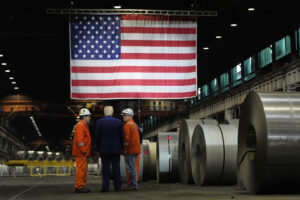Beijing – The Next Target of US Sanctions?
Vladimir Putin’s war on Ukraine has animated the use of economic sanctions in an unprecedented way. Strenuous US-China relations, exacerbated by Nancy Pelosi’s provocative visit to Taiwan, raise the question of whether Washington would impose similar measures on Beijing in the face of a military invasion of Taiwan.

Image Credit: Stock photo/Al Arabiya News
Vladimir Putin’s war on Ukraine has animated the use of economic sanctions in an unprecedented way. Strenuous US-China relations, exacerbated by Nancy Pelosi’s provocative visit to Taiwan, raise the question of whether Washington would impose similar measures on Beijing in the face of a military invasion of Taiwan. Secretary of Treasury Janet Yellen has warned that the Biden administration would do so, while the President himself has pledged defense in case of an unprecedented attack. Though the world’s largest economies are deeply intertwined, a closer look at the composition of these ties, as well as the strategic behavior of corporations, reveals an imbalance that favors the US. Should Beijing invade Taiwan, Washington would turn to sanctions, for it holds the economic sway. On a corporate level, sanctions would incur heavy losses on some companies, but a larger group stands to gain.
Liberal arguments that stress how mutual economic interests deter sanctions due to self-inflicting harm overlook how the Sino-American commercial relationship is tilted toward US favor, both in terms of volume and types of goods. For one, China exports to the United States almost three times the value of goods than vice-versa, giving the US more leverage in blocking imports. Second, the goods that American companies export to China are more specialized, capital-intensive, life-essential, and overall difficult to source elsewhere. These include advanced semiconductors, industrial machinery, and pharmaceuticals. Meanwhile, US imports from China are mainly manufactured consumer goods that are less essential and more easily substitutable, like cell phones and other household goods, toys, or textiles. US export bans to China would be far more damaging and outweigh retaliatory measures.
Even without a state-mandated embargo, regional trade would plummet if China tried to invade as companies naturally limit risk exposure. Shipping goods through a conflict zone is extremely risky for both companies and their insurers. In the Russo-Ukrainian war commercial ships have been hit by projectiles in the Black Sea, including an Estonian cargo ship that sank near Odesa after a missile strike. Maritime trade insurance companies have subsequently either suspended coverage of journeys to Black Sea ports or sharply raised insurance premiums that render them too costly for companies to sustain. Strategic business behavior is further demonstrated by the mass corporate exodus that Russia has experienced since its invasion. In the first two months alone around one thousand companies from numerous countries voluntarily curtailed their operations in Russia beyond the degree of the bare minimum legally required by international sanctions. Companies that have decided to stay have incurred high costs, while many have been rewarded in financial markets. Commodity companies that have left, like BP or ExxonMobil, have been able to offset losses of Russian revenues or assets through the rise in commodity and stock prices.
Though sanctions would create winners that benefit from higher prices, market share, and the elimination of Chinese competition, there would still be losers among the most vulnerable, such as business internationalists who derive large shares of revenue from the Chinese markets, companies with substantial direct investments in China, and those who rely on local suppliers or resources that cannot be substituted elsewhere. Businesses like American car makers that rely on Chinese inputs but with less orientation towards international markets would also be hurt if they cannot replace parts elsewhere.
Yet, the burden on the loser camp depends on the degree of diversification or substitutability of supplies, sales, inputs, and investments. Costs for remaining in Beijing can outweigh those for exiting. Ultimately, even those who draw large profits in the Chinese market would have incentives to leave. Moreover, moving manufacturing out of China to other Southeast Asian countries is a trend that has long been underway due in part to rising labor costs. It has received a boost since the US-China trade war, as well as supply chain vulnerabilities exposed by the pandemic and ongoing war.
Winners from sanctioning China would be those who welcome price hikes from the rising demand for goods. Victors like the LNG-giant Cheniere, or tech companies Facebook and Google who compete with China’s accelerating AI sector but face restrictions from the Chinese market, would reinforce sanctions as their PR agencies and lobbyists would garner support for them. Business internationalists with limited to no business in China would dominate this camp, but it would also include nationalists who would profit from weaker import competition. Apart from the defense industry, which would bank on increased military spending, this would include much of the remaining US manufacturing industry, such as in chemicals, machinery, computers, apparel, motor vehicles and parts, in addition to energy industries and agriculture. Eliminating Chinese competition would enhance their market power, allowing them to raise prices even further.
Those who doubt Washington’s resolve to act should also consider that Taiwan is far more important geo-strategically, economically, and politically than Ukraine. Beyond the US’s legal commitment to assist Taipei in an armed conflict, trade with the island is far more significant to the United States than with Ukraine. Taiwan is crucial for global cutting-edge semiconductor supply, which is key for the technological leadership of the US military and private tech companies alike. By contrast, trade with Ukraine is paltry and mostly entails iron, steel, and agricultural products. Geopolitically, Taiwan is crucial to any US containment strategy towards China, for securing global maritime trade routes, and for security commitments to allied Japan, South Korea, and the Philippines.
Given these immense potential costs to China, it is unlikely an invasion will occur any time soon. By doing so, the CCP would risk economic isolation that could threaten not only its claim to power but the country’s overall status in a global order it has reaped spectacular benefits from over the last four decades. Beyond that, China would need to overcome immense logistical constraints to carry out a successful invasion. As opposed to Ukraine, Taiwan is an island separated from the mainland by a narrow strait of violent waters. A Chinese invasion would require immense amphibious capability which it simply lacks. The prospect of necessary military expenditure even dwindles as the country grapples with the domestic economic downturn. For now, it thus seems that potential US sanctions are not even the strongest impediments to forcing reunification. Though if Beijing made the attempt anyway, sanctions would most certainly follow.
Matthew Geissendoerfer (he/him) is a second-year MA student at NYU’s International Relations Program. He is most interested in questions of global political economy, particularly regarding the role of the United States in the international system, its foreign policy, and the influence of multinational corporations. He is originally from Switzerland, where he obtained a BA in Political Science and Law. Spot him exploring the city by bike in his free time, photographing NYC’s multifaceted architecture.




